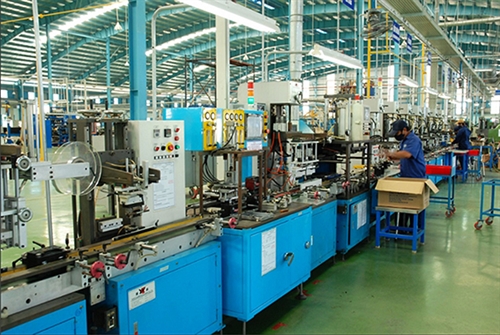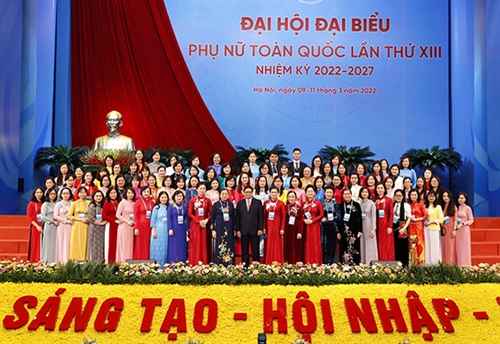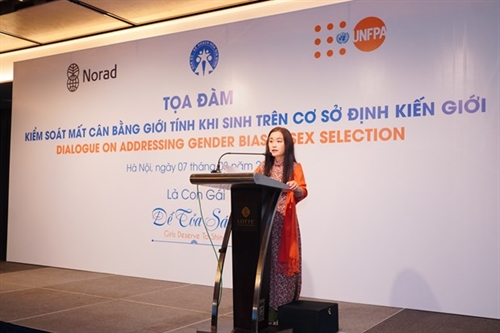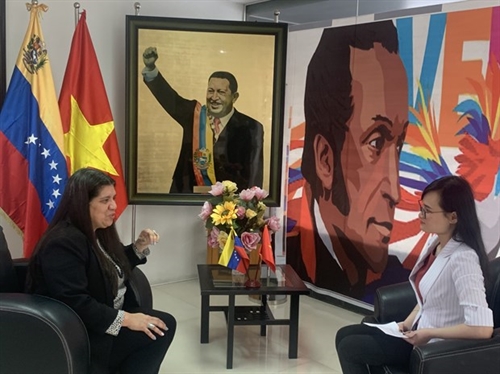Nguyen The Manh
General Director
Vietnam Social Security
Unemployment insurance policy has been regarded as an important tool to administer the labor market, aiming to build a competitive, high-quality one that operates in a transparent and effective manner. In order to properly perform this role in Vietnam at present, unemployment insurance policy should be instituted in the general socio-economic development program as well as social, insurance, labor and wage policies, thereby materializing the undertaking that nobody will be left behind in the course of building a prosperous and happy society.
Unemployment insurance policy - the fruit of “doi moi”
After 1986 when the cause of “doi moi” (renewal) was initiated by the Communist Party of Vietnam (CPV) at its sixth national congress, the country started shifting from the centralized economy with state subsidies to the socialist-oriented market economy. At the initial stage, to promote the development of the labor market, the Council of Ministers (now the Government) introduced various policies to revamp the organizational structures and labor on the principle of ensuring work quality and efficiency and promoting performance capability of every laborer. Under these policies, laborers in state bodies who voluntarily retired would be provided a lump-sum allowance calculated on the basis of the number of their working years. For laborers who were redundant but did not voluntarily retire, they would be allowed to take a maximum leave of 12 months but still receive a payment equal to 75 percent of their wages plus allowances and other subsidies to seek new jobs.
On October 9, 1989, the Council of Ministers issued Decision No. 176/HDBT on restructuring of labor in state-run economic units to provide hundreds of thousands of redundant laborers in the state sector with multiple regimes and policies, such as the job-leaving allowance regime and the temporary work stoppage allowance regime, etc.
On June 23, 1994, the Labor Code was passed at the fifth session of the 9th National Assembly and took effect on January 1, 1995, marking an important turning point in regulating industrial relations in Vietnam. The Code was later revised in 2002, 2006 and 2007, and added with different provisions on benefits and supports for laborers in all economic sectors who lost their jobs or were sacked. Unemployment and unemployment insurance were recognized and affirmed in various documents of the CPV and institutionalized into various policies suitable to each period. Article 140 of the 1994 Labor Code (revised in 2002) provided for the first time unemployment insurance. To meet the urgent need for support policies for employees in the socialist-oriented market economy, which has developed more dynamically and flexibly in the country, on June 29, 2006, the National Assembly passed the Social Insurance Law with provisions on unemployment insurance policy taking effect on January 1, 2009. Under the Law, the Unemployment Insurance Fund was set up on the basis of contributions of employees and employers; funding from the central budget; profits from the fund’s investment activities, and other lawful sources. After more than four years of implementation, the unemployment insurance provisions of the Social Insurance Law were revised and incorporated in the Employment Law passed by the National Assembly on November 16, 2013, with effect on January 1, 2015. The Unemployment Insurance Fund is used for payment of severance allowance, support for vocational training to improve professional qualifications and skills of employees; job training; job counseling and recommendation; payment of health insurance for unemployment insurance beneficiaries; investment for fund preservation and growth; and payment of expenses for unemployment insurance management. So, unemployment insurance is not only important for employees and enterprises but also plays a role in ensuring socio-economic stability and serving as a tool to materialize the social security policy of the country and to manage the labor market.
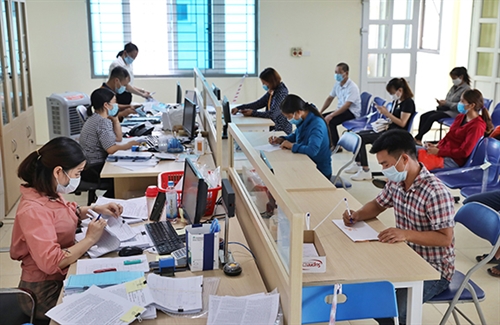 |
| Processing unemployment insurance dossiers for workers at Bac Giang Employment Services Center__Photo: Danh Lam/VNA |
Implementation of unemployment insurance policy
The number of insurance participants have been quickly increased and the policy coverage has significantly expanded
The number of unemployment insurance participants quickly rose from 5.99 million in 2009, when the policy was first introduced, to over 13.39 million in 2021, representing about 27 percent of the eligible workforce. This reveals that both employees and enterprises have become aware of the importance and ‘mainstay’ role of the unemployment insurance and actively participated in.
Unemployment insurance allowances have been paid to more people
Unemployment allowances are paid to job losers who have participated in the unemployment insurance for full 12 months or over, at the level equal to 60 percent of the average of last six months’ wages for at least three months. In 2020, the number of applications filed for unemployment allowances nationwide was approximately 1.12 million, 32 percent higher than 2019’s figures. The unemployment allowances paid in 2020 to 1,065,696 laborers amounted to VND 16,312 billion, up by 36 percent over 2019. In 2021, the unemployment allowances were paid to 663,225 laborers with the total sum of VND 15,274 billion. In 2020 and 2021, production and business activities were heavily hit by the Covid-19 pandemic with many people having lost their jobs and incomes. Therefore, the unemployment insurance policy has affirmed more clearly its role in partial income stabilization for a section of employees and their families, thus contributing to stabilizing the social order and safety.
Money paid under the unemployment allowance regime represented a large ratio (over 90 percent) of the annual total indemnity paid under various unemployment insurance regimes. Hence, a higher number of unemployment allowance beneficiaries would lead to a larger total sum paid annually under various unemployment insurance regimes. The total unemployment insurance sum was VND 4,882.9 billion in 2015 (up by 1.3 percent over 2014); VND 5,113 billion in 2016 (up by 4.7 percent over 2015); VND 7,935.831 billion in 2017 (up by 52.2 percent over 2016); VND 10,101 billion in 2018; VND 12,635 billion in 2019; VND 17,149 billion in 2020; and VND 15.3 billion in 2021.
More and more employees have been provided with job counseling and recommendation
In addition to unemployment allowances, employees are also provided with free employment counseling and recommendation suitable to their professional qualifications and skills. The number of people provided with job counseling and recommendation constantly rose from 125,562 in 2010 to 463,859 in 2015; 1,390,429 in 2018; and 2,209,048 in 2020.
A larger number of employees have been given job learning assistance
Employees enjoying unemployment allowances and wishing to learn jobs will receive job learning assistance through vocational education institutions but not directly provided with cash payments in order to ensure the materialization of this policy and their early return to the labor market. The job learning support level is equal to the short-term job learning expense level set by the vocational education law. The job learning support duration depends on the job-training duration of each employee, but must not exceed six months and the job-learning cost will be covered by the Unemployment Insurance Fund. Since May 15, 2021, the job-learning support level has been increased from VND 1,000,000/month to VND 1,500,000/month under the Prime Minister’s Decision 17/2021/QD-TTg dated March 31, 2021. The number of people provided with job-learning support has markedly increased from 270 in 2010 to 24,363 in 2015, and 20,506 by the end of 2020, with a total support amount of VND 72 billion. Such number is estimated to reach 17,105 in 2021 with a total support amount of VND 53.37 billion.
The number of people provided with job-learning support tends to rise from year to year, especially after the Employment Law took effect. However, as compared to the total number of unemployment allowance beneficiaries, the number of job learners is not so high as the majority of unemployed laborers who are unskilled and confronted with difficulties in life without saved resources or other supports and just need unemployment allowances. Job learning is not their choice as the job-learning support duration is short (six months at most), which is not up to the requirements of training of intermediate or higher-level occupations. Moreover, in some localities, laborers have very few options as the list of training disciplines is limited, and training facilities and equipment remain inadequate and obsolete.
Financial support has been provided for training to raise employees’ professional qualifications and skills
Since 2015, the Employment Law has introduced the regime of support for training to raise employees’ professional qualifications and skills. Under this regime, employers will be provided with financial support for training of their employees if they satisfy four conditions: (i) Having paid unemployment insurance premiums for their employees for 12 or more consecutive months by the time they request the support; (ii) meeting with difficulties due to economic recession or other force majeure reasons, which compel them to restructure or change production and business technologies; (iii) having insufficient funds for organizing training for their employees to raise professional qualifications and skills; and (iv) having plans for training employees and maintaining jobs for them as approved by competent state bodies. The maximum training support duration under the approved plans is six months. This additional policy is of extreme importance, aiming to retain employees, reduce their layoff for the reasons of organizational restructuring or application of new production and business technologies.
In the context of numerous economic difficulties due to the pandemic, threatening to break the labor supply chain, at the proposal of the Ministry of Labor, Invalids and Social Affairs and with the consent of competent authorities, on July 1, 2021, the Government adopted Resolution 68/NQ-CP providing a number of policies to support employees and employers meeting with difficulties due to the Covid-19 pandemic. Prominent are policies on direct support for enterprises to overcome difficulties, such as the policy on reduction of the labor accident and occupational disease insurance premium level to zero percent of the wage fund which serves as the basis for payment of social insurance premiums, for 12 months, with the total reduction amount of about VND 4,500 billion; the policy on temporary cessation of remittance into the retirement and survivorship allowance fund for six months at most with the estimated fund of VND over 8,000 billion; the policy on support for employee training with the estimated fund of around VND 4,500 billion to be covered by the Unemployment Insurance Fund.
In order to realize the Resolution, the Prime Minister issued Decision 23/2021/QD-TTg on July 7, 2021, guiding the implementation of a number of policies to support employees and employers affected by the Covid-19 pandemic. The implementation of support policies have been simplified to the utmost with a view to provide employees and employers with the most convenient and earliest access. On July 8, 2021, Vietnam Social Insurance issued Official Letter 1988-BHXH-TST on the implementation of Resolution 68/NQ-CP and Decision 23/2021/QD-TTg, allowing the procedures to be carried out by social insurance offices in diverse forms (traditional and electronic) and in a flexible manner, creating the most favorable conditions for eligible laborers and enterprises. By July 16, 2021, the policy on reduction of labor accident and occupational disease insurance premiums had been completely realized. By December 31, 2021, eight provincial-level Social Insurance Offices had received the training support decisions and paid more than VND 5 billion for 14 units to train 1,443 employees.
Some suggestions and orientations
Unemployment insurance constitutes an important social policy in the social security system, which contributes to the achievement of social progress and justice as well as sustainable national development. It serves as an important instrument of the labor market policy. It not only secures the partial compensation for job losers’ incomes but also actively supports the job retraining and recommendation for laborers to early return to the labor market. Meanwhile, employers are given various incentives to receive and retain employees as long as possible, particularly disadvantaged ones.
So, in the coming period, efforts should be concentrated on the following matters:
Firstly, the improvement of unemployment insurance management must be incorporated in the overall program on reform of social insurance, labor, wage and other relevant policies based on the state policies on socio-economic development, labor and employment.
Secondly, to further strengthen and develop the system of unemployment insurance implementation organizations towards neatness, efficiency, effect, and modernization in order to earn the confidence of, and better serve, the unemployment insurance participants and beneficiaries.
Thirdly, to revise the Employment Law, the unemployment insurance policy and the employment policy toward attaching importance not only to overcoming consequences for the unemployed via payment of unemployment allowances, provision of job counseling and recommendation, and job learning support but also to the application of measures to prevent and minimize unemployment through supporting enterprises and laborers to maintain jobs, ensuring their lawful rights and interests and coordinated review and assessment of the materialization of unemployment insurance policy.
Fourthly, to promote the core value of the unemployment insurance policy, namely job counseling and recommendation, vocational training and job maintenance; to further consolidate and better the operation of employment service organizations.
Fifthly, to comprehensively renovate public information contents, forms and methods suitable to the peculiar characteristics and nature of different groups of unemployment insurance participants in different regions and areas to ensure effectiveness of this work.-
